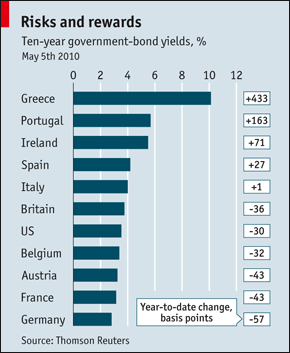ON MAY 2nd euro-zone governments and the IMF set out the terms of a €110 billion ($145 billion) rescue for Greece. That was far more than had previously been pledged but it was not enough to settle investors’ nerves. Stockmarkets in Europe and America slumped on May 4th and fell again the next day. Greek bonds continued to trade at distressed levels.
The poor reaction in part reflects fears that rescue money could be withheld. Its disbursal depends on brutal austerity measures. Failure to carry these out could jeopardise funding and push Greece into default. Even success would leave it with an intolerable public-debt burden.

A rescue that is painful for Greece has not given other countries much relief, either. True, only a few countries are being forced into austerity by bond markets. Most rich countries, including many in the euro zone, have seen their bond yields fall since the start of the year (see chart). But the cost of public borrowing in euro-zone countries with big budget deficits, notably Portugal and Ireland but also Spain, is going in the opposite direction.
Bond markets judge Portugal as the next riskiest country in the euro zone. Its bond yields jumped to 5.7% on May 5th, an increase of 1.6 percentage points since the start of the year. Its public debt reached 77% of GDP last year, about average for Europe, but its budget deficit was an alarming 9.4% of GDP. Investors fear the rising debt burden cannot be borne: GDP growth has been weaker than anywhere else in the euro zone (bar Italy) since 2000. Portugal is small, accounting for just 2% of euro-zone output and public debt. Investors who need to hold euros have other places to go.
Many in Lisbon feel that Portugal is unfairly picked on. They point out that the government has played fair by the euro-zone’s fiscal rules, cutting its budget deficit from 6.1% of GDP in 2005 to 2.8% by 2008. Public-sector jobs have been cut by 10%. A 2006 reform limited real increases in pensions to years when the economy grows rapidly. Age-related spending will increase by much less than in most other parts of Europe. There has been modest progress (though not enough) in freeing up labour markets and cutting red tape. Portugal has relaxed (a bit) its stringent rules on hiring and firing. It takes less time and expense to start a business than five years ago.
It needs to do more. Portugal can be shoved around because it relies so heavily on foreign capital. Its net international debt (what Portugal owes to foreigners, less the foreign assets it owns) rose to 112% of GDP last year, after a run of huge current-account deficits. Around half of this is public debt; a slice of it is direct investment in big firms; but a worryingly large chunk, some 46% of GDP, is funnelled through the banking system. The banks’ credit lines need to be rolled over and depend on the standing of public debt.
Recession has helped in one respect: private-sector borrowing needs fell to zero last year from 7% of GDP in 2008, thanks to higher saving and cuts in business investment. But if Portugal is to refinance its existing debts at tolerable interest rates, it needs a lower cost of public borrowing. That will require much faster action to cut the budget deficit. The government has already pledged cuts in jobless benefits, which are generous even by euro-zone standards. Public pay could be frozen for longer. Big transport projects could be sacrificed: the government’s fetish for such schemes means the returns to further investment are likely to be low. Selling state stakes in big firms could yield as much as €15 billion, enough to cover last year’s deficit.
There are some small mercies among the savagery. One is the steady fall in the euro, a victim of the crisis (see article). That ought to help Portugal sell into markets it has tried to target—in Angola, Brazil, China and America. Another is that some pain will fall on foreign suppliers: uncompetitive countries, such as Greece, Portugal and Spain, tend to suck in lots of imports when their domestic spending is strong.



















